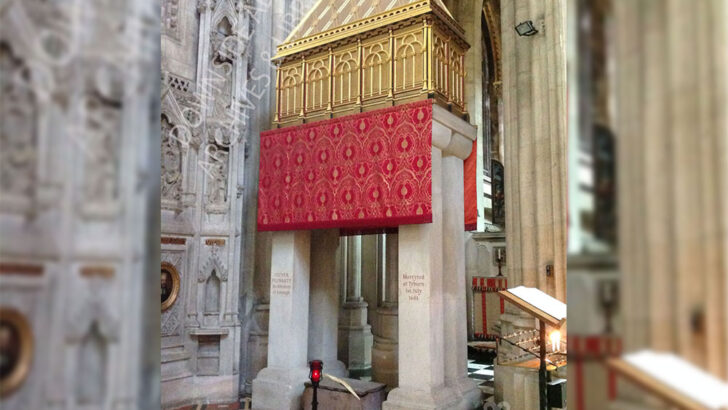The Captain and the Saint: The Story of St Oliver Plunkett, by Fintan Tracey
(Published by Fintan Tracey, Drogheda, €10.00 plus €2.50 postage, direct from fintansfineart@gmail.com)
Next year marks the 400th anniversary of the birth of St Oliver Plunkett. This little book by Drogheda-based artist Fintan Tracey is the first small droplet of what will undoubtedly be a stream of books that will appear nearer the actual anniversary of his birth, which was on November 1 1625.
Fintan Tracey is an artist, and this is very much an artist’s book. Though he draws on standard books, and has he says made effort to have the facts right, his series of paintings that illustrate the book are the heart of his vision of the saint, he realises the man and his times in broad brush images.
Plunkett
Indeed the best chapter in the book is an account of Oliver Plunkett sitting to have his own portrait made, a portrait for posterity, for he is imprisoned in London for treason.
The artist, one Garrett Morphy, had been commissioned by the archbishop’s friend and confessor Fr Maurus Corker, a Benedictine. The episodes of his life are related by Oliver Plunkett himself, in some seven brief chapters.
The book is aimed at those who want a simple accessible account of what is, all in all a complicated tale of courage, perseverance and betrayal. Not everyone, as I have said before, wishes to plunge at once into an overly scholarly book. As in life, there are horses for courses. This book will happily meet the needs of many who flock to the national shrine in Drogheda.
The story of the persecution, betrayal and death of Oliver Plunkett is a grim one”
The shine in Downside in Somerset, however, where the saint’s body is preserved is unmentioned and the role of the Benedictines in Oliver Plunkett last years passed over. This is a pity, as his martyrdom, brought about by the lies of Titus Oates, is as much an English story as it is an Irish one.
I have been looking back to see what was done on 300th anniversary of his birth and find it was little enough. Firstly the actual date of the saint’s birth was still being disputed at that time; but more importantly, Oliver Plunkett had been beatified in 1920, a time of national struggle. This had been enough. It was not until 1981 that he was finally canonised, with great ceremonies in Rome, Ireland and England.
The story of the persecution, betrayal and death of Oliver Plunkett is a grim one. But next year, instead of picking over yet again the ancient quarrels, Catholics should keep constantly in mind that in 1997 Plunkett was made a patron saint for peace and reconciliation in Ireland. He was adopted by the prayer group campaigning for peace in Ireland, St Oliver Plunkett for Peace and Reconciliation.
Divisions
This should still be the theme for the 400th anniversary as Ireland remains as much in need of the reconciliation and the promotion of accord and peace as it ever it did in the past.
The old divisions which brought about the martyr’s death have faded, but others are now coming to the fore, some of them alas being promoted as ‘national causes’. Everyone living on this island, no matter what their culture or religion, will support the cause of reconciliation and increased interpersonal understating. Fintan Tracey’s little book is a first effort in that direction.


 Peter Costello
Peter Costello The shrine of St Oliver Plunkett at Downside
The shrine of St Oliver Plunkett at Downside 